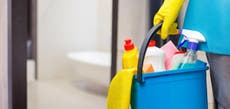Sorry, paying your cleaner is not a feminist issue – it's a moral responsibility
If the same cleaner is coming to your house on a regular basis then you are their de facto employer, and that carries the weight of responsibility

Today, I asked my cleaner how she was doing. Yes, I am a freelancer and a feminist and I have a cleaner. Cue gasps. We’ll come back to that.
According to the latest government guidelines, cleaners can now return to work in people’s homes provided they – and everyone in the home – appear healthy. (For the purposes of this article, we’re talking about domestic cleaners paid cash in hand with no contract or legal employment rights, rather than agency-contracted workers or those who clean our country’s offices at night: a whole other headache.)
There are some caveats – hand-washing, window opening, and of course that all-important two metres of social distance. But legally speaking, cleaners can go back to work. My cleaner has already been asked to do so by seven of her clients. But is it morally defensible?
What has now inevitably been dubbed “Cleanergate” can be roughly boiled down to three distinct arguments. Firstly, the question of whether it is it moral – or somehow anti-feminist – to have a cleaner at all. It’s undeniable that domestic labour is socially, historically and psychologically associated with women. It’s undeniable that women still shoulder a disproportionate burden of it. The majority of cleaners are women: of lower socioeconomic backgrounds, of migrant or BAME heritage. So this is clearly a feminist and class issue. But the idea that it is *women* outsourcing domestic labour to other women just doesn’t hold. Logic dictates that there are just as many men benefiting from cleaners as women. Of course, men are not called upon to defend it, or called “bad feminists”.
But whether having a cleaner is acceptable is utterly irrelevant right now. The fact is, approximately one in three UK households do employ a cleaner. That covers a massive spectrum of situations.
Secondly, we come to the question of whether you should pay your cleaner to stay at home – effectively furloughing them on full pay – despite what the government has said. I have been paying my cleaner to stay home since mid-March and will continue to for as long as I can. But I am lucky to be in a position where a) I can continue to pay her at all, and b) I have the time and physical ability to clean my own home. I may not be eligible for government self-employed support grants (I went freelance last year) and my career / earning prospects have, to put it mildly, tanked, but I still have that privilege. As Pandemic made clear, it’s easy to be kind when you’re rich.
But not everyone who employs a cleaner is affluent, or even able-bodied. And regardless of what a certain cyst of a Twitter commentariat would have you believe, not everyone who has a cleaner can necessarily do without. There are many differently abled or vulnerable people for whom home help is a necessity. And consider the full-time working parents trying to homeschool their kids: time to clean is also a luxury.
We cannot know how much the pandemic has damaged people’s financial prospects. Many people might not feel able to afford a cleaner anymore. But cleaners are by and large appallingly paid – the average UK hourly rate is just over £8. If you are trying to budget, it doesn’t seem the obvious place to make cuts. Plus, I’m willing to bet that whatever your financial woes, your cleaner’s are far worse. So it seems to me that if you can continue to pay your cleaners, there is absolutely no question that you should.
Of course, you can then argue, where do we draw the line? Should we continue to pay our hairdressers not to cut our hair, our window cleaners not to clean our windows? To that I say, if the same cleaner is coming to your house on a regular basis then you are their de facto employer, that carries the weight of responsibility.
And now the final argument: if you can still afford your cleaner, should you pay them to come into work? And this is where things get, forgive the hyperbole, insane.
We’re still debating the safety of public transport, whether we should not wear a mask, and if we can meet more than one person from two metres away. So, how the hell is it morally defensible to expect your cleaner to risk their life – and the lives of their families – to come into your home if you can pay them to stay away? How could you pay someone to take a risk you wouldn’t take yourself?
There are some women arguing – stridently – that they have to bring their cleaners back because their useless husbands and children won’t help them in the home. But outsourcing your husband’s failings to your (usually working class, mostly female and often socioeconomically deprived) cleaner is about as anti-feminist as it gets. Although, while we’re at it, men in this debate should ask themselves whether they’re working proactively to readdress the gendered imbalance in domestic labour before they presume to comment on women’s choices.
There are others arguing that it’s somehow “empowering” for your cleaner to be able to come back to work: that for them, it’s a source of self-esteem or pride. That is the most utterly ludicrous thing I’ve ever heard. You think your cleaner wants to risk their life to clean your toilet? You are wrong.
I’m not trying to be some condescending, white middle-class “saviour” of the poor and downtrodden, or to make decisions for them. But to argue that it’s the cleaner’s personal choice to return to work is to completely ignore the stark power imbalance, and the insecurity of cash-in-hand work.
But if you can continue to pay your cleaner at all, and you physically can clean up after yourself, then you should. That is not a feminist issue: it’s a moral one. It’s abundantly clear we cannot trust the government or the state to protect the country’s cleaners. So it’s up to us – all of us.





Join our commenting forum
Join thought-provoking conversations, follow other Independent readers and see their replies